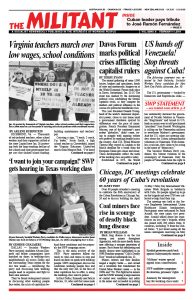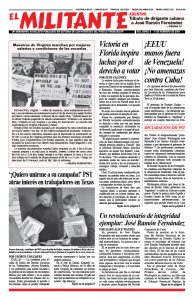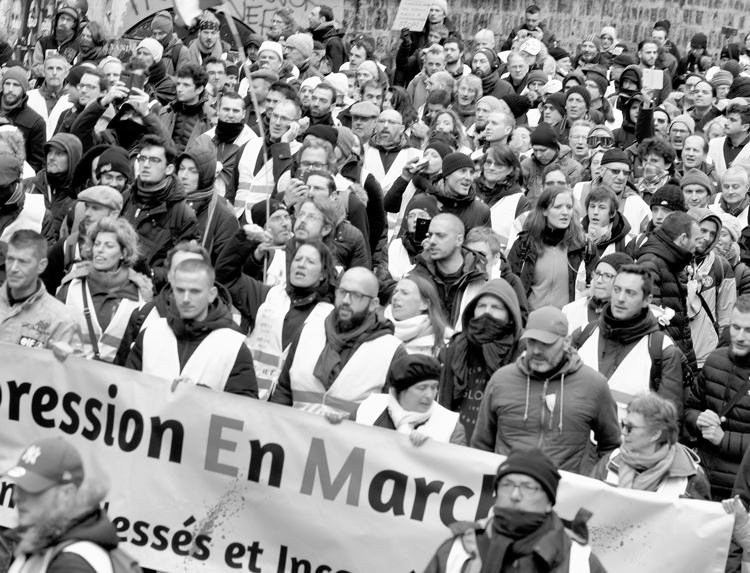The annual gathering of some 3,000 bosses, bankers and speculators, heads of state and meritocratic hangers-on at the World Economic Forum took place in Davos, Switzerland, Jan. 22-25. The event was marked by the sharpening political crisis confronting the various capitalist rivals, as they compete for markets and political influence in the course of a protracted worldwide crisis.
This year President Donald Trump, head of the world’s dominant imperialist power, chose to stay home amid a government shutdown spurred by differences over the pace of immigration. French President Emmanuel Macron, one of the continent’s most ardent “globalists,” didn’t come, trying to grapple with ongoing yellow vest protests by working people across the country. And U.K. Prime Minister Theresa May stayed in London as the March deadline for a break from the European Union gets closer and closer. These developments reflect the mark of the working class on politics today.
Established in 1971, the World Economic Forum has become one of the vehicles of the “world order” established after the Second World War through which different capitalist rulers seek to gain advantage for their competing interests. And where the liberal glitterati gather to puff up their anti-working-class schemes and themes they are determined to foist on us.
Unless you’re a president or other government leader, you have to be invited and pay $20,000 to get into this year’s “Globalization 4.0” shindig. Once inside, a hot dog costs $43.
Today organizations like the World Economic Forum, the European Union and World Trade Organization are being pulled apart by the rulers’ deepening competition that is rooted in the four-decades-long decline in their profit rates.
In recent years the forum has been marked by the declining influence of the U.S. rulers and the much more declining fortunes of the other capitalist powers that won out in the second imperialist world war, as well as the growing influence of Beijing. Despite Washington’s relative decline, there is no rising power that can yet match its economic and military clout.
For President Trump, events like the forum are less and less central. His government seeks to advance the interests of the U.S. capitalist rulers by engaging in direct talks with other government leaders, bypassing all the “globalist” world bodies. The Trump administration wields protectionist tariffs and sanctions on the one hand and promises of aid and profitable relations on the other in its “negotiations” with the U.S. rulers’ rivals.
“This disruption is a positive development,” said Secretary of State Mike Pompeo in a video message beamed to the meeting. He was responding to German Chancellor Angela Merkel and a long line of other speakers who attacked Washington’s unilateral trade policies. Former Indian Commerce Minister Kamal Nath said Trump was “leading the world in making the global trading order collapse.”
For the U.S. capitalist rulers, the “global trading order” means, as Trump puts it, “America first.”
“The U.S. ruling families and their rivals in Europe and the Pacific engage in ceaseless efforts to maximize their own profits the world over,” explains Steve Clark in the introduction to The Clintons’ Anti-Working-Class Record; Why Washington Fears Working People. “And it’s working people the world over who are carrying the burdens of that deepening social calamity.”
Advice from a billionaire
In a letter to the meeting, billionaire U.S. investor Seth Klarman — whose annual advice to the forum is sought after by many capitalist investors worldwide — warned that mounting government debt could trigger “the next financial crisis.” And, he advised, “It can’t be business as usual amid constant protests, riots, shutdowns and escalating social tensions.”
The splintering of the European Union was on full display. EU authorities had threatened disciplinary measures against the Italian government over its $2.8 trillion debt, which they say breaks “EU rules.” But then they turned a blind eye in December to Rome’s refusal to lower the debt when the Italian government promised to reign in some of its social spending plans.
Formed to give capitalist rulers in Europe greater clout in conflicts with U.S. bosses, the EU is used by capitalist rulers in Germany, and to a lesser degree in France, to bolster their profits at the expense of their weaker rivals in Greece, Spain and Italy, hitting working people there the hardest.
The EU parliament adopted measures Jan. 17 on the eve of the World Economic Forum that allow the European Commission to withhold funding to any member state it chooses, making it easier for EU bureaucrats to punish governments like Italy or Greece they find themselves in conflict with.
EU officials are keen to keep the U.K. tied into the European “Union” despite the 2016 referendum vote where a majority — largely working class — voted for Britain to get out of the protectionist trading bloc. Prime Minister May, who like most of the British rulers wants to stay in the EU, is seeking parliamentary backing for her plans to defy the vote and hold onto as much of the U.K.’s EU integration as possible.
Government indifference to the depression conditions stalking millions of working people has spurred growing electoral support for political parties opposed to the EU and broader discontent across much of Europe. The capitalist rulers fear deeper working-class action. Canadian federal pension fund boss Michael Sabia echoed the concern of many when he told the Davos crowd that the yellow vest protests sweeping large parts of France are a foretaste of “unrest to come.”


